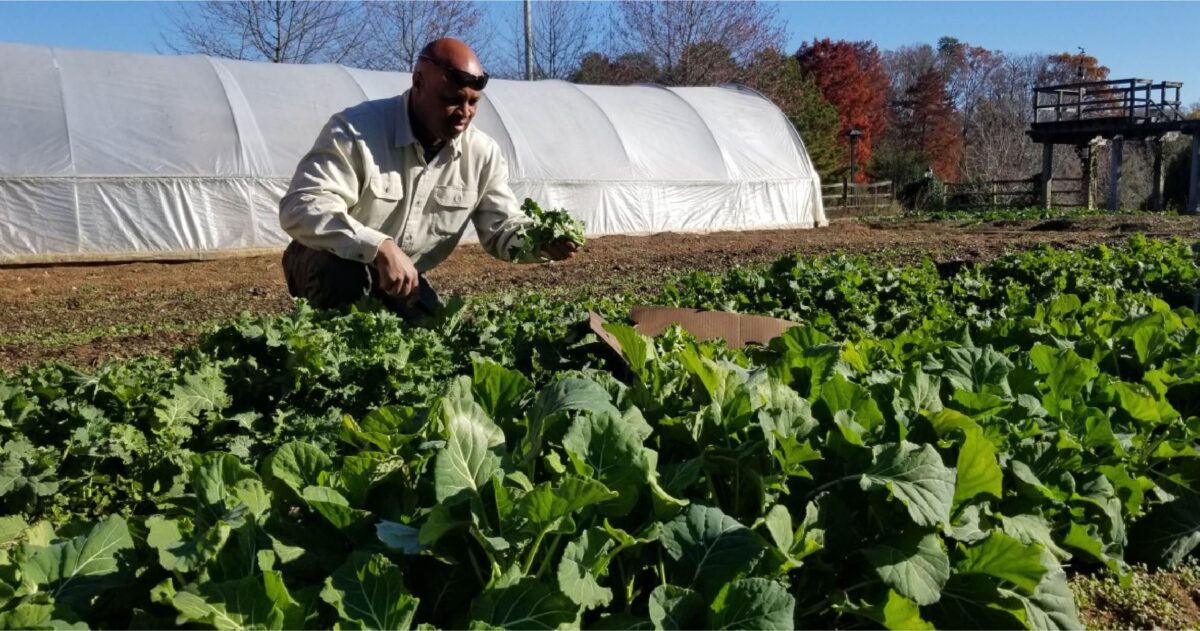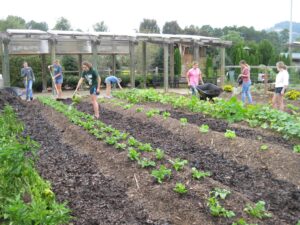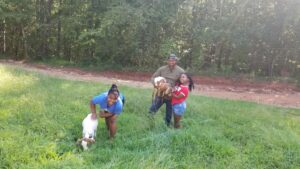Bon Appétit and Green Valley Farms Sow the Seeds of a Long-Term Partnership
- by Peter Todaro

In 1999, Bon Appétit was the first food service company to formalize a commitment to supporting local food systems: mandating that our culinary teams purchase 20% of their ingredients from owner-operated small local farms. For many Bon Appétit chefs, the relationships formed with these local farmers and makers have morphed into friendships that have spanned decades.
To celebrate these fruitful partnerships, we’ve created an almost-quarterly series that tells the stories of these beloved Farm to Fork and Locally Crafted vendors. This quarter, we’re featuring Bruce Adams, the owner and operator of Green Valley Farms, and manager of Furman University’s Furman Farm.

Students tend to rows of greens and vegetables at the Furman Farm.
The Furman Farm sits just steps away from Swan Lake, an iconic body of water on Furman University’s campus in Greenville, South Carolina. Part of the Shi Institute for Sustainable Communities, the farm serves as a living laboratory for engagement with food systems and sustainability, providing an on-campus site for growing food, of course, but also academic research, employment opportunities for students, and community events. Despite its quarter-acre size, the farm boasts solar panels, rows upon rows of vegetables, and also serves as the site of the University’s in-house composting system. The fulcrum upon which the farm and its cascade of programs and initiatives relies is Bruce Adams, Furman’s Farm Manager.
Now in his 15th year at Furman, Bruce oversees roughly 30 students who tend to the farm’s vegetable plot, seeding, weeding, and harvesting produce that is sent to the Bon Appétit at Furman team, who in turn send food waste back to the farm for composting. With leaves from campus added to the mix and no external inputs used, Furman has created an entirely closed loop system under Bruce’s leadership. “Bruce is a great educator,” says Weston Dripps, Furman’s Executive Director of the Shi Center. “His passion, patience, and enthusiasm are contagious.” In 2019, the Furman Farm produced 57 tons of compost, returning fertility to the soil that offers up corn, okra, green beans, tomatoes, peppers and more each growing season.
But Bruce’s collaboration with the Bon Appétit at Furman team doesn’t end when he goes home from work. As a 4th generation farmer, and owner and operator of Green Valley Farms, Bruce is a Farm to Fork vendor, too.
From an early age, Bruce was hooked on farming. He tended to a garden and flock of laying hens during his high school years and continued to dabble in agricultural ventures until a trip to a Whole Foods Market in Greenville sparked a “eureka” moment that prompted him to commit to a long-term career in farming. “Farmers were dirt poor when I was growing up. That visit made me realize that farming had changed,” says Bruce. “Growing sustainably could be much more lucrative.” From that moment, Bruce began ramping up production at what would become Green Valley Farms and started attending the downtown Greenville Farmers’ Market, where he would quickly sell out of vegetables and meat. Soon, chefs approached Bruce for wholesale orders, and once Bon Appétit became Furman’s dining services provider, he was well positioned to supply the team with a wide variety of products at scale.

Bruce poses with his granddaughters and two Green Valley Farms goats.
After many years of practice in animal husbandry, Bruce has created a system in which all of the beef cows, pigs, goats, and lambs are bred, born, and raised at Green Valley before heading to a local processor for the animal’s “one bad day.” This differs from many other systems, which often don’t breed or have animals born on-site. Animals are given as much freedom to roam as possible, with Bruce’s cows grazing on pasture and his pigs foraging and browsing in the farm’s woodlands. This nearly closed-loop system provides him with an intimate understanding of the animals he tends to and makes it so that he can adapt supply to meet demand from the Bon Appétit at Furman team, with whom he is in constant contact throughout the year. In addition to supplying Furman with a variety of vegetables, pork, and most of its ground beef, Bruce also supplies goat and lamb for special events and cultural celebrations.
Bruce’s parallel relationship with Bon Appétit through his work as Manager of the Furman Farm means that he is an almost omnipresent fixture at Furman’s Daniel Dining Hall. Whether he is picking up food waste that is destined for the compost heap, delivering an order from Green Valley, or helping out with an event like the annual Eat Local Challenge, Bruce is constantly collaborating with the Bon Appétit team. “With Bruce, it’s a never-ending world of ‘what can we do and how can we do it?’” says General Manager Derek Morgan. “We are always working together on something.” One of these upcoming projects includes an aquaponics system at the Furman Farm that will produce greens for Furman’s salad bar, as well as fresh-water prawns.

The flood wasters reached as high as the cabin of Bruce’s truck.
But the relationship between Bruce and the Bon Appétit team extends beyond workplace collaboration. During the height of COVID-19’s initial wave in 2020, Green Valley Farms experienced a catastrophic flood that wiped out its infrastructure and some livestock. When the Bon Appétit team heard, they rallied around Bruce, ensuring that they bought as many vegetables and meat products from him as they could. “The team was still asking how they could help more than a month after it happened,” says Bruce. “That was worth its weight in gold.” For the team at Bon Appetit, the opportunity to innovate and collaborate with Bruce over the years, and in the future, is also worth its weight in gold.